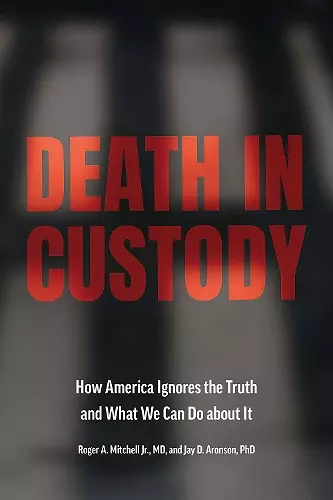Death in Custody
How America Ignores the Truth and What We Can Do about It
Jay D Aronson author Roger A Mitchell, Jr author
Format:Hardback
Publisher:Johns Hopkins University Press
Published:31st Oct '23
Should be back in stock very soon

The United States significantly undercounts the number of people who die in law enforcement custody each year. How can we fix this?
Deaths resulting from interactions with the US criminal legal system are a public health emergency, but the scope of this issue is intentionally ignored by the very systems that are supposed to be tracking these fatalities. We don't know how many people die in custody each year, whether in an encounter with police on the street, during transport, or while in jails, prisons, or detention centers. In order to make a real difference and address this human rights problem, researchers and policy makers need reliable data.
In Death in Custody, Roger A. Mitchell Jr., MD, and Jay D. Aronson, PhD, share the stories of individuals who died in custody and chronicle the efforts of activists and journalists to uncover the true scope of deaths in custody. From Ida B. Wells's enumeration of extrajudicial lynchings more than a century ago to the Washington Post's current effort to count police shootings, the work of journalists and independent groups has always been more reliable than the state's official reports. Through historical analysis, Mitchell and Aronson demonstrate how government at all levels has intentionally avoided reporting death in custody data.
Mitchell and Aronson outline a practical, achievable system for accurately recording and investigating these deaths. They argue for a straightforward public health solution: adding a simple checkbox to the US Standard Death Certificate that would create an objective way of recording whether a death occurred in custody. They also propose the development of national standards for investigating deaths in custody and the creation of independent regional and federal custodial death review panels. These tangible solutions would allow us to see the full scope of the problem and give us the chance to truly address it.
Death in Custody is a radical shift in how to analyze violence, misconduct, and dysfunction in the criminal justice system in the modern era.Aronson and Mitchell offer recommendations for attempting to sort out this crisis, but this book would be important even if it didn't. Death in Custody makes the case that white supremacy, economic inequality, and exploitation are among the causes of this festering problem.
—The Progressive
Death in Custody provides readers with the brutal history on which the U.S. criminal legal system was built.These unnecessary deaths will continue to occur until there is a uniform way of making our judicial system transparent and accountable.
—ZEKE magazine
In Death in Custody, Roger A. Mitchell Jr. and Jay D. Aronson argue that deaths in law enforcement custody amount to a public health emergency. Their work ties in high-profile examples and shows how journalists have long done the work of tracking in-custody deaths.Mitchell and Aronson argue that collecting accurate data is the first step toward addressing this crisis.
—Chris Blackwell
There's no real way to know how many people die in custody each year. In their book, Death in Custody, Roger and Jay chronicle the efforts of activists and journalists to uncover the true scope of this problem, to try to figure out how many people actually are dying in custody. And they argue for a straightforward solution. I learned a lot from this book. It blew my mind.
—DeRay McKesson, Pod Save the People
Dr. Mitchell and Professor Aronson's meticulous examination of our criminal legal system is a shocking exposure of just how little our society knows or cares to know about people dying in custody. In their careful accounting of various attempts to understand and prevent deaths in custody, one thing becomes clear: the reforms on the margins that federal, state, and local governments engage in are simply not enough to stop the human suffering that occurs every day in this country.
—Hunter Parnell, Public Defenseless Podcast
Deeply researched.
—AZ Luminaria
In a striking collaboration, Roger A. Mitchell (a pathologist) and Jay D. Aronson (a human rights expert) expose an underappreciated problem at the intersection of public health and criminal justice: People who die in police custody are often unaccounted for. By combining perspectives ranging from historical analysis to contemporary methods in public health and statistics, the authors highlight a gap that reveals major challenges in the criminal legal system and in our public health infrastructure.
—Harvard Public Health, "Best Public Health Books of 2023"
In their courageous and often gripping book Death in Custody, Roger A. Mitchell (a pathologist) and Jay D. Aronson (a human rights expert) teach us that the process through which deaths are counted or characterized is a justice issue in and of itself.
—C. Brandon Ogbunu, Harvard Public Health
No one really knows exactly how many people across the country die in jails and prisons each year. This intricate investigation by Aronson and Mitchell details how things came to be this way.
—Los Angeles Times
[Mitchell and Aronson] lay out the nation's systemic failure to track deaths caused by police and correctional officers. The book scrutinizes bias in death investigations, exploring how coroners and medical examiners have produced autopsies that minimized or erased the role of police, and in effect, blamed victims for their own deaths.
—Guardian
ISBN: 9781421447087
Dimensions: 229mm x 152mm x 28mm
Weight: 590g
328 pages